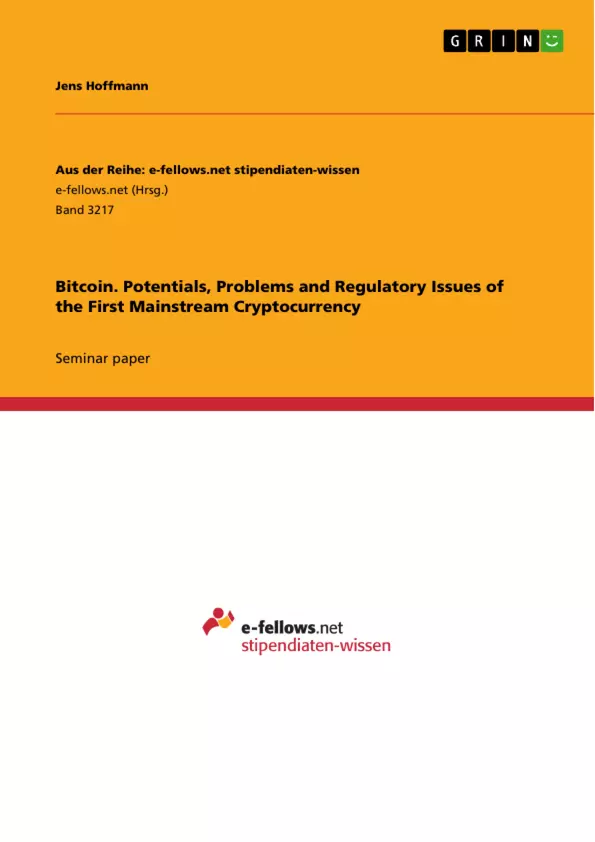According to conventional wisdom, the cryptocurrency Bitcoin exhibits several improvements compared to the traditional banking system, namely its decentralized structure and a proof-of-work consensus mechanism. However, authors frequently discover problems and propose all kinds of fundamental changes, such as completely new consensus mechanisms by which they want to replace the existing system. That raises the question of how the further development of Bitcoin has to be promoted. We review the most relevant literature concerning Bitcoin’s current role and future potential from different angles. By putting ourselves in the position of involved actors, we find out what they expect from the Bitcoin network and how desirable additional regulatory measures are for them. Although it is generally accepted that appropriate governance can contribute to a more stable and secure currency, cryptocurrencies’ unique characteristics add a new dimension to this idea. That is why we sporadically throw in comparisons to local currency schemes already in existence in order to conclude how the question of regulating a decentralized currency must be addressed.
Inhaltsverzeichnis (Table of Contents)
- Introduction
- Current State of Knowledge
- Framework
- Bitcoin's Role for Different Economic Actors
- Private Households and Investors
- Online Businesses
- Central Banks
- National Governments
- Results
- Discussion
- Conclusion
- References
Zielsetzung und Themenschwerpunkte (Objectives and Key Themes)
This paper aims to understand the challenges and opportunities presented by Bitcoin, particularly focusing on the implications of wider adoption for various societal groups. The paper examines Bitcoin's potential as a complementary currency, distinct from its potential as a complete replacement for traditional currencies, which is considered too speculative for meaningful analysis.
- The scalability and limitations of Bitcoin's current infrastructure.
- The role and potential of Bitcoin for diverse economic actors.
- The need for and potential impact of regulatory measures.
- Comparisons with existing local currency systems.
- The significance of Bitcoin's unique features and its decentralized structure.
Zusammenfassung der Kapitel (Chapter Summaries)
- Introduction: This chapter introduces Bitcoin and its emergence as a major cryptocurrency. It discusses Bitcoin's unique features, its decentralized structure, and the proof-of-work consensus mechanism that powers its network. The chapter also highlights the growing popularity of Bitcoin and its increasing media coverage.
- Current State of Knowledge: This chapter examines the existing body of research on Bitcoin, focusing on challenges like scalability limitations, the fixed money supply, and concerns about consumer protection. It presents various proposals for addressing these challenges, including potential changes to the mining reward system and alternative consensus mechanisms.
- Framework: This chapter outlines the paper's approach and methodology, which involves a literature review to assess the implications of broader Bitcoin adoption for different societal groups. It emphasizes the paper's focus on Bitcoin as a complementary currency rather than a complete replacement for traditional currencies.
- Bitcoin's Role for Different Economic Actors: This chapter delves into the potential impact of Bitcoin on various actors within the economy, including private households, online businesses, central banks, and national governments. It analyzes their perspectives on Bitcoin and explores their expectations for the future development of the cryptocurrency.
Schlüsselwörter (Keywords)
This paper focuses on the potential, problems, and regulatory issues surrounding Bitcoin, the first mainstream cryptocurrency. Key topics include decentralized structure, proof-of-work consensus mechanism, scalability limitations, consumer protection, alternative consensus mechanisms, national governments' responses, and comparisons to local currency systems.
Frequently Asked Questions
What are the main potentials of Bitcoin discussed in the paper?
The paper highlights Bitcoin's decentralized structure and the proof-of-work consensus mechanism as significant improvements over traditional banking systems.
What are the primary problems associated with Bitcoin?
Key issues include scalability limitations, a fixed money supply, and concerns regarding consumer protection and market stability.
How does the paper view Bitcoin's future role?
The analysis focuses on Bitcoin as a complementary currency rather than a full replacement for traditional fiat currencies.
What is the role of central banks and governments regarding Bitcoin?
The paper explores how national governments and central banks respond to Bitcoin, considering both the need for regulation and the risks it poses to monetary control.
Can Bitcoin's consensus mechanism be changed?
The paper reviews literature proposing fundamental changes, such as replacing proof-of-work with alternative consensus mechanisms to improve efficiency and stability.
- Quote paper
- Jens Hoffmann (Author), 2019, Bitcoin. Potentials, Problems and Regulatory Issues of the First Mainstream Cryptocurrency, Munich, GRIN Verlag, https://www.grin.com/document/493411



